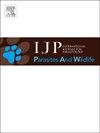Gastrointestinal helminth infections and ectoparasitism in wild rodents along wildlife-human interfaces in Tanzania
IF 2.2
3区 医学
Q3 ECOLOGY
International Journal for Parasitology-Parasites and Wildlife
Pub Date : 2025-01-18
DOI:10.1016/j.ijppaw.2025.101040
引用次数: 0
Abstract
Background
Gastrointestinal parasites pose a significant threat to human and domestic animal health across Africa. Despite numerous studies on ectoparasitism and endoparasitism in small mammals across different regions of the continent, the ecological role of rodents in transmission dynamics of gastrointestinal helminths remains poorly understood. This study aimed to identify gastrointestinal helminths in rodents and evaluate the influence of host-related factors, ectoparasite infestations, and environmental variables on helminth prevalence at wildlife-human interfaces in Tanzania.
Methods
Gastrointestinal helminth eggs were quantified using the modified McMaster method on samples from captured rodents. Correlations between parasitological data, host scaled mass index (SMI), and ectoparasite intensity were analyzed. Generalized linear mixed models (GLMMs) were employed to assess helminth occurrence in relation to host demographics, ectoparasite load, and environmental factors.
Results
The overall prevalence of gastrointestinal helminths was 53.59%. Seven distinct helminth egg types were identified, representing two major taxa: nematodes and cestodes. Among the nematodes, eggs of Trichuris spp., Strongyloides spp., Syphacia spp., Capillariidae and Spirurida were identified. Cestode eggs present were Hymenolepis-like eggs and eggs of Anoplocephalidae. Whipworms (Trichuris spp.) exhibited the highest prevalence (23.2%), followed by threadworms (Strongyloides spp.) at 22.1%. Anoplocephalid eggs showed the lowest prevalence, at 0.56%. The occurrence of gastrointestinal helminths in rodents was significantly associated with increased SMI and ectoparasite (flea and mite) infestations, while also varying across rodent species and collection sites.
Conclusions
This study highlights the presence of potentially zoonotic helminths, including capillariids and Hymenolepis-like species, in rodents at wildlife-human interfaces. Furthermore, it identifies associations between gastrointestinal helminth infections and host body condition, as well as the intensity of ectoparasite infestations. These findings underscore the importance of considering host and environmental factors in understanding helminth transmission dynamics and their potential impact on public and veterinary health.

坦桑尼亚野生动物-人类交界区野生啮齿动物胃肠道寄生虫感染和体外寄生虫
背景胃肠道寄生虫对整个非洲的人类和家畜健康构成重大威胁。尽管对非洲大陆不同地区小型哺乳动物的体外寄生和内寄生进行了大量研究,但啮齿类动物在胃肠道蠕虫传播动力学中的生态作用仍然知之甚少。本研究旨在鉴定坦桑尼亚啮齿动物胃肠道蠕虫,并评估宿主相关因素、体外寄生虫感染和环境变量对野生动物-人类界面蠕虫流行的影响。方法采用改良麦克马斯特法对捕获的啮齿动物进行胃肠道蠕虫卵定量。分析了寄生虫学数据、宿主比例质量指数(SMI)和体外寄生虫强度之间的相关性。采用广义线性混合模型(glmm)评估寄生虫发生与宿主人口统计学、外寄生虫负荷和环境因素的关系。结果胃肠道蛔虫总检出率为53.59%。鉴定出七种不同的蠕虫卵类型,代表两大分类群:线虫和壳虫。在线虫中鉴定出毛线虫、圆线虫、梅毒线虫、毛线虫和螺旋体线虫的卵。卵有膜鼻虫类卵和无头蝇科卵。鞭虫感染率最高(23.2%),其次是线虫(22.1%)。无头类卵的患病率最低,为0.56%。啮齿类动物胃肠道蠕虫的发生与SMI和外寄生虫(跳蚤和螨)感染的增加显著相关,同时在啮齿动物种类和采集地点之间也存在差异。结论本研究强调了在野生动物与人类交界的啮齿类动物中存在潜在的人畜共患寄生虫,包括毛细线虫和膜膜虫样物种。此外,它还确定了胃肠道寄生虫感染与宿主身体状况之间的关系,以及体外寄生虫感染的强度。这些发现强调了在了解寄生虫传播动力学及其对公众和兽医健康的潜在影响时考虑宿主和环境因素的重要性。
本文章由计算机程序翻译,如有差异,请以英文原文为准。
求助全文
约1分钟内获得全文
求助全文
来源期刊

International Journal for Parasitology-Parasites and Wildlife
Medicine-Infectious Diseases
CiteScore
3.80
自引率
5.60%
发文量
113
审稿时长
45 days
期刊介绍:
The International Journal for Parasitology: Parasites and Wildlife (IJP-PAW) publishes the results of original research on parasites of all wildlife, invertebrate and vertebrate. This includes free-ranging, wild populations, as well as captive wildlife, semi-domesticated species (e.g. reindeer) and farmed populations of recently domesticated or wild-captured species (e.g. cultured fishes). Articles on all aspects of wildlife parasitology are welcomed including taxonomy, biodiversity and distribution, ecology and epidemiology, population biology and host-parasite relationships. The impact of parasites on the health and conservation of wildlife is seen as an important area covered by the journal especially the potential role of environmental factors, for example climate. Also important to the journal is ''one health'' and the nature of interactions between wildlife, people and domestic animals, including disease emergence and zoonoses.
 求助内容:
求助内容: 应助结果提醒方式:
应助结果提醒方式:


